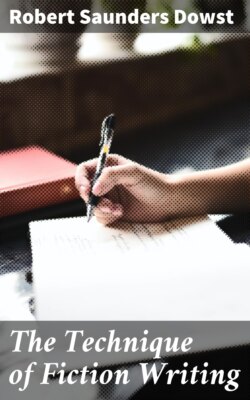Читать книгу The Technique of Fiction Writing - Robert Saunders Dowst - Страница 3
На сайте Литреса книга снята с продажи.
PREFACE
ОглавлениеTable of Contents
Many books have been written on fiction technique, and the chief excuse for the present addition to the number is the complexity of the subject. Its range is so wide, it calls for so many and so different capacities in one attempting to discuss it, that a new work has more than a chance to meet at least two or three deficiencies in all other treatments.
I believe that the chief deficiency in most works on fiction technique is that the author unconsciously has slipped from the viewpoint of a writer of a story to that of a reader. Now a reader without intention to try his own hand at the game is not playing fair in studying technique, and a book on technique has no business to entertain him. Accordingly, I have striven to keep to the viewpoint of one who seeks to learn how to write stories, and have made no attempt to analyze the work of masters of fiction for the sake of the analysis alone. Such analysis is interesting to make, and also interesting to read, but it is not directly profitable to the writer. It is indirectly profitable, of course, but it will give very little direct aid to one who has a definite story idea and wishes to be told the things he must consider in developing it and writing the story, or to one who wishes to be told roughly how he should go about the business of finding real stories. In fact, I believe that discussion and analysis of perfect work has a tendency to chill the enthusiasm of the beginning writer. What he chiefly needs is to be told the considerations he must hold in mind in conceiving, developing, and writing a story. The rest lies with his own abilities and capacities to work intelligently and to take pains.
Therefore the first part of this book takes up the problems of technique in the order in which they present themselves to the writer. Beginning with matters of conception, the discussion passes to matters of construction and development, and finally to matters of execution, or rather the writing of a story considered as a bare chain of events. Then the matters of description, dialogue, the portrayal of character, and the precipitation of atmosphere are discussed, and lastly the short story and novel, as distinct forms, are taken up.
Usually the propositions necessary to be laid down require no demonstration; they are self-evident. That is why a book on technique for the writer need not indulge in fine-spun analysis of perfect work. Where analysis will lend point to the abstract statement, I have made it, but my constant aim has been not to depart from the viewpoint that the reader has in mind some idea of his own and wishes to be told how to handle it. Unquestionably literary dissection is useful in that it gives the beginning writer familiarity with the terminology and processes of the art, but the main object of a book on technique is to place the results of analysis, directly stated, in logical sequence.
I will note one other matter. A great part of the technique of fiction writing concerns matters of conception and development which are preliminary to actual writing. In fact they are essentially and peculiarly the technique of fiction. The story that is not a justly ordered whole, with each part in its due place and no part omitted, cannot have full effect, however great the strictly executive powers of its writer. Verbally faultless telling will not save a story which is not logically built up and developed, either before writing or in the process of writing. The art of telling a story is largely the art of justly manipulating its elements. The art of telling it with verbal perfection is not so much a part of the strict technique of fiction writing as it is of the general technique of writing. Therefore I have made little attempt to discuss the general art of using words. For assistance in studying the art of expression the reader should turn to a work on rhetoric. The subject is too inclusive for adequate treatment here. Moreover, it is debatable whether the art of verbal expression can be studied objectively with any great profit. But the art of putting a story together can be studied objectively with profit, and its principles are subject to direct statement.
I desire to acknowledge my indebtedness to Mr. William R. Kane, of The Editor Magazine, for much helpful criticism and many valuable suggestions.
